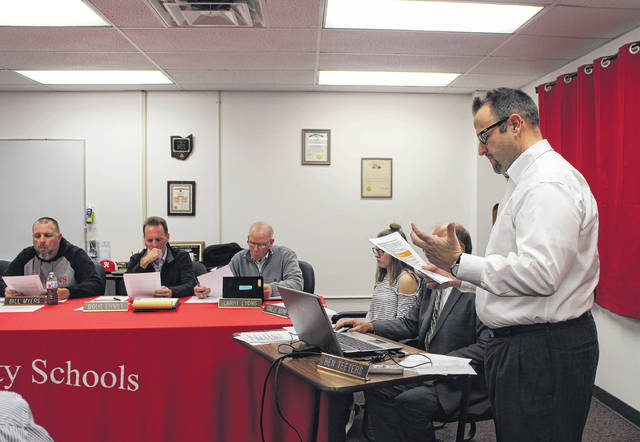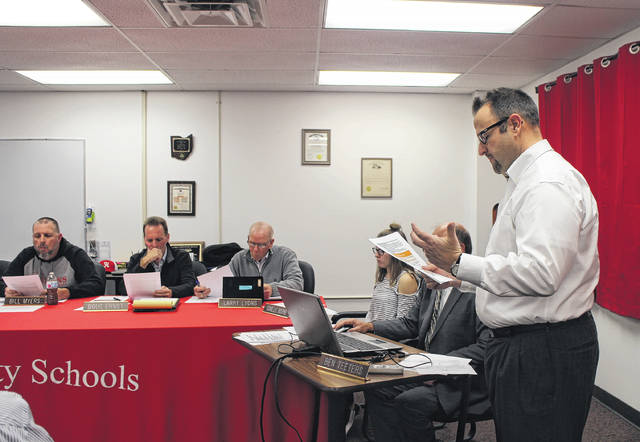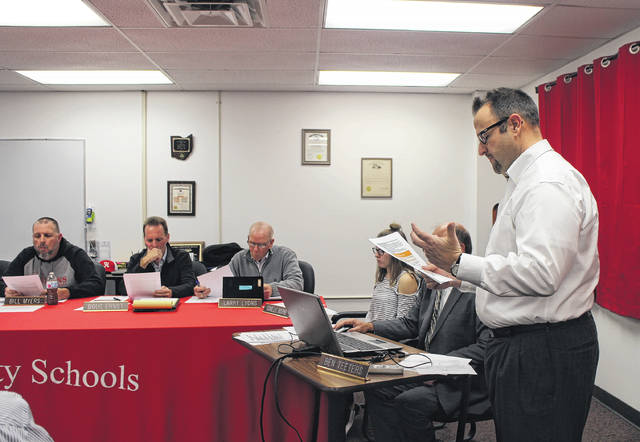


Hillsboro Mayor Drew Hastings said Thursday he will withdraw legislation on two Downtown Redevelopment Districts after the Hillsboro City Schools Board of Education voted 4-1 against its approval Wednesday evening.
“Since the school board was not behind a long-term commitment to the city’s redevelopment efforts, we’re obliged to pull the DRD legislation from consideration,” Hastings told The Times-Gazette on Thursday. “This DRD legislation was unnecessarily politicized from the start, and was a great opportunity as an economic development plan. I’m reminded of the old saying, ‘You can lead a horse to water but you can’t make him think.’”
In what amounts to a form of tax increment financing (TIF), if properties in redevelopment districts are improved and gain a higher property tax value, 70 percent of the revenue from the increased property taxes is directed back into the district’s coffers. The remaining revenue is distributed between the entities to which it would already be given, including the local school district.
DRDs were created last year by the state legislature to give local communities a new economic development tool.
Hillsboro City Council recently heard a second reading on legislation creating two DRDs – one for the uptown area and the other for the former stockyards/lumberyard property and other nearby properties – but with the school board’s vote against approval, the legislation would have to either have been revised to just 10 years, or withdrawn, since the school board must approve any DRD set to last more than a decade.
According to Nate Green, an economic development specialist with consulting firm The Montrose Group, the uptown DRD would have stayed in place for 20 years, while the stockyard DRD would have lasted 15 years.
After some discussion Wednesday evening, mostly between board member Larry Lyons, Green and Hastings, the board voted the measure down with Lyons, Beverly Rhoads, Tom Milbery and Bill Myers voting against, and Doug Ernst and Isabelle Bourne voting in favor, although Bourne’s vote does not count since she serves as a student representative on the board rather than an an elected official.
During discussion, Lyons said he was mainly concerned about the length of time the DRDs were scheduled to be in place, and said he feels DRDs would create a situation with “good intentions, unintended consequences.”
“Twenty years scares me,” Lyons said, since he said there were too many unknowns to justify passing the legislation.
Lyons added that he has observed “apprehension” among Hillsboro residents with whom he had spoken about the matter.
Green contended that 20 years from an economic development perspective is not very long.
“You have to put the seeds in the ground,” Green said.
Ernst asked why the districts were set for different amounts of time, and Hastings said the stockyards district is set for 15 years because a possible hotel being constructed in the area would bring in more revenue over less time.
According to Hastings, the uptown district was set for 20 years because it would generate revenue at a slower rate.
Lyons asked if “seed money” would be used to jumpstart the district, since no revenue will be generated unless property owners make improvements to their properties. Green said a voluntary assessment would be put in place for property owners who elect to pay it, but otherwise no funds would be taken from other sources.
Lyons said the accompanying economic development plan with the DRD legislation seemed “boilerplate” and offered nothing specific to Hillsboro, although Green and Hastings argued the plan was designed to be flexible.
“We didn’t want to say, ‘This can only be used for X,’” Green said.
Lyons said he found the plan vague instead of flexible, and said the legislation itself left too much room for error.
Milbery, the only other member of the board to enter the discussion, commended Hastings on his presentation at the last school board meeting, but voted against the legislation.
At one point, Hastings said that while he respects the school board’s responsibility to secure a high quality of life while children are in school, he feels DRDs fulfill his responsibility to provide a high quality of life for children outside of school.
On Thursday, Hastings expressed his gratitude to Ernst and Bourne, and said, “They both saw this was ultimately for our young people.”
Hastings said he would notify council members of his decision by email.
In other business, the board recognized and heard a presentation from the Intermediate Student Council, represented by Peighton Bledsoe, TJ Tilton, Rylie Holland, Ava Campbell and Madison Dearmon.
Supt. Tim Davis said the Hillsboro Robotics program will participate in a robotics competition on Saturday, Nov. 18 at the high school. Doors open at 8 a.m., and the competition will begin at 9 a.m. According to the Hillsboro City Schools website, 30 teams will compete against one another, and several local businesses including Weastec, McCarty Associates, GE, Corvac Composites, SSCC, Ohio University and Mid-Atlantic will be part of the judging process. The competition is free to spectators.
For further coverage, check Saturday’s edition of The Times-Gazette, or visit www.timesgazette.com.
Reach David Wright at 937-402-2570, or on Twitter @DavidWrighter.


